Comprehensive Analysis of Integrated Reporting in Business Development
VerifiedAdded on 2020/04/13
|13
|4125
|29
Essay
AI Summary
This essay provides a comprehensive analysis of integrated reporting in the context of modern business practices. It explores the concept of integrated reporting as a crucial communication process for organizations, focusing on its benefits and challenges. The essay examines the value of integrated reporting, its role in financial and non-financial communication, and its impact on stakeholder value. It delves into the integration of various reporting standards, the role of the International Integrated Reporting Council (IIRC), and the six capitals framework. Furthermore, the essay discusses the relationship between integrated reporting and financial analysis, sustainability management, and quality management. The analysis highlights the importance of integrated reporting in enhancing organizational development and improving the overall reporting system of business organizations, emphasizing both qualitative and quantitative information disclosure.
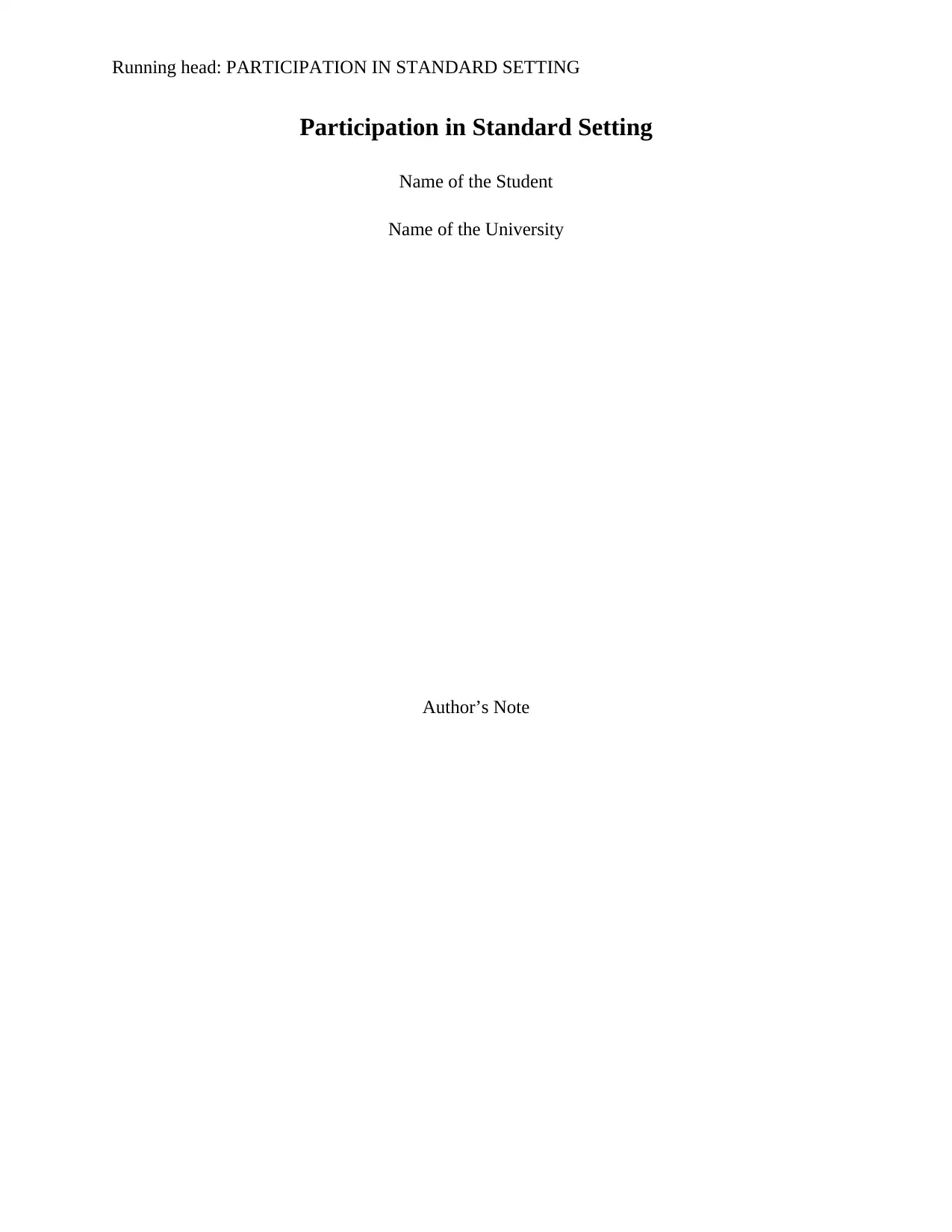
Running head: PARTICIPATION IN STANDARD SETTING
Participation in Standard Setting
Name of the Student
Name of the University
Author’s Note
Participation in Standard Setting
Name of the Student
Name of the University
Author’s Note
Paraphrase This Document
Need a fresh take? Get an instant paraphrase of this document with our AI Paraphraser
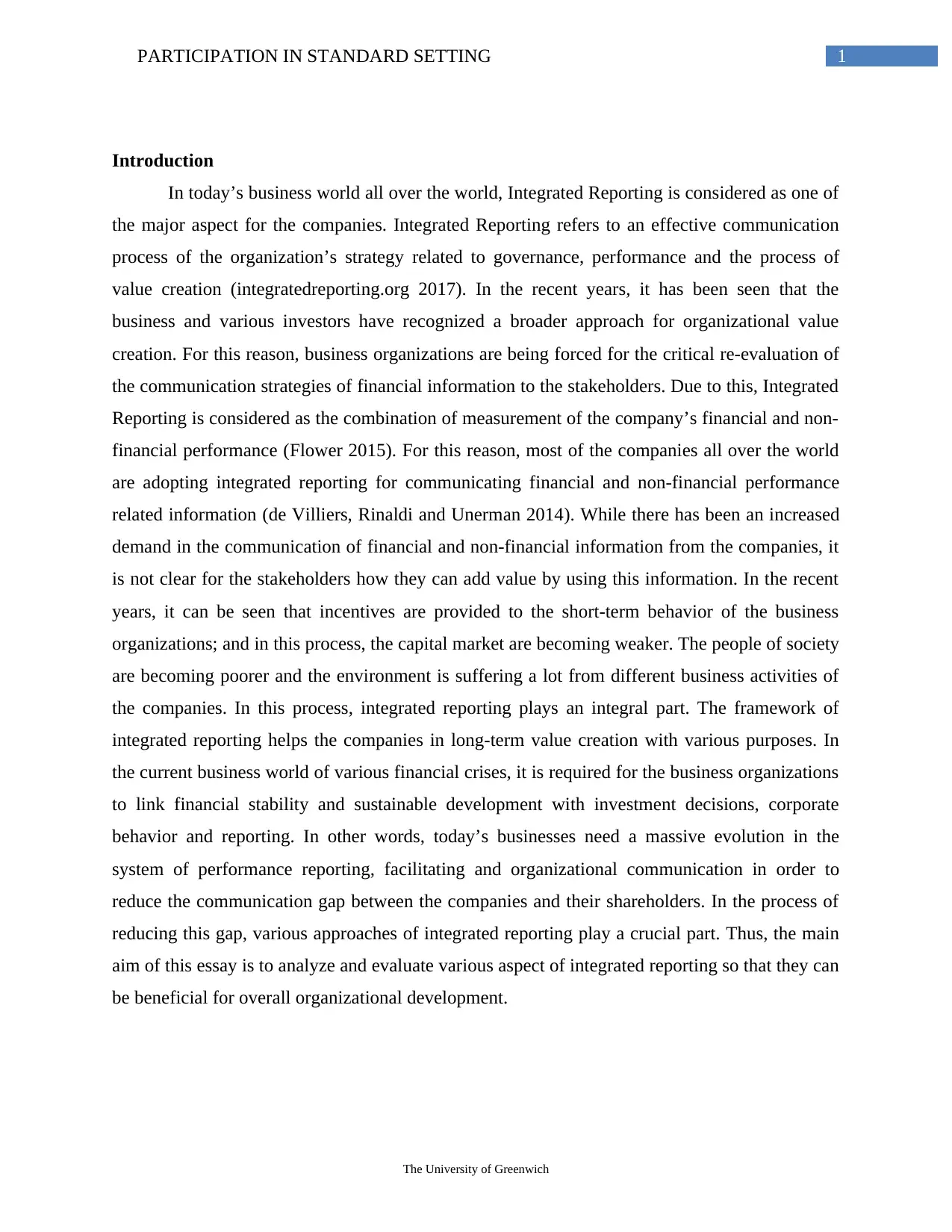
1PARTICIPATION IN STANDARD SETTING
Introduction
In today’s business world all over the world, Integrated Reporting is considered as one of
the major aspect for the companies. Integrated Reporting refers to an effective communication
process of the organization’s strategy related to governance, performance and the process of
value creation (integratedreporting.org 2017). In the recent years, it has been seen that the
business and various investors have recognized a broader approach for organizational value
creation. For this reason, business organizations are being forced for the critical re-evaluation of
the communication strategies of financial information to the stakeholders. Due to this, Integrated
Reporting is considered as the combination of measurement of the company’s financial and non-
financial performance (Flower 2015). For this reason, most of the companies all over the world
are adopting integrated reporting for communicating financial and non-financial performance
related information (de Villiers, Rinaldi and Unerman 2014). While there has been an increased
demand in the communication of financial and non-financial information from the companies, it
is not clear for the stakeholders how they can add value by using this information. In the recent
years, it can be seen that incentives are provided to the short-term behavior of the business
organizations; and in this process, the capital market are becoming weaker. The people of society
are becoming poorer and the environment is suffering a lot from different business activities of
the companies. In this process, integrated reporting plays an integral part. The framework of
integrated reporting helps the companies in long-term value creation with various purposes. In
the current business world of various financial crises, it is required for the business organizations
to link financial stability and sustainable development with investment decisions, corporate
behavior and reporting. In other words, today’s businesses need a massive evolution in the
system of performance reporting, facilitating and organizational communication in order to
reduce the communication gap between the companies and their shareholders. In the process of
reducing this gap, various approaches of integrated reporting play a crucial part. Thus, the main
aim of this essay is to analyze and evaluate various aspect of integrated reporting so that they can
be beneficial for overall organizational development.
The University of Greenwich
Introduction
In today’s business world all over the world, Integrated Reporting is considered as one of
the major aspect for the companies. Integrated Reporting refers to an effective communication
process of the organization’s strategy related to governance, performance and the process of
value creation (integratedreporting.org 2017). In the recent years, it has been seen that the
business and various investors have recognized a broader approach for organizational value
creation. For this reason, business organizations are being forced for the critical re-evaluation of
the communication strategies of financial information to the stakeholders. Due to this, Integrated
Reporting is considered as the combination of measurement of the company’s financial and non-
financial performance (Flower 2015). For this reason, most of the companies all over the world
are adopting integrated reporting for communicating financial and non-financial performance
related information (de Villiers, Rinaldi and Unerman 2014). While there has been an increased
demand in the communication of financial and non-financial information from the companies, it
is not clear for the stakeholders how they can add value by using this information. In the recent
years, it can be seen that incentives are provided to the short-term behavior of the business
organizations; and in this process, the capital market are becoming weaker. The people of society
are becoming poorer and the environment is suffering a lot from different business activities of
the companies. In this process, integrated reporting plays an integral part. The framework of
integrated reporting helps the companies in long-term value creation with various purposes. In
the current business world of various financial crises, it is required for the business organizations
to link financial stability and sustainable development with investment decisions, corporate
behavior and reporting. In other words, today’s businesses need a massive evolution in the
system of performance reporting, facilitating and organizational communication in order to
reduce the communication gap between the companies and their shareholders. In the process of
reducing this gap, various approaches of integrated reporting play a crucial part. Thus, the main
aim of this essay is to analyze and evaluate various aspect of integrated reporting so that they can
be beneficial for overall organizational development.
The University of Greenwich
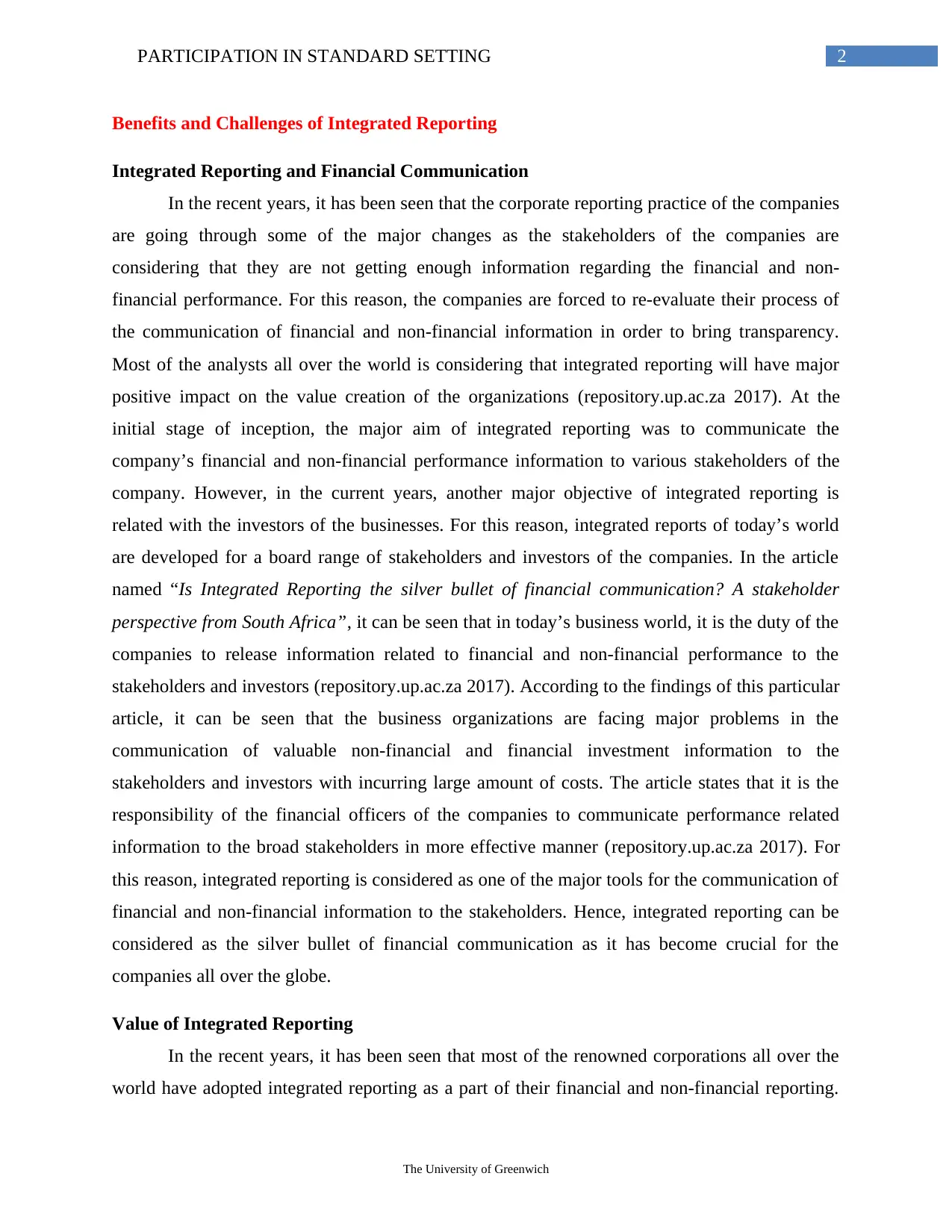
2PARTICIPATION IN STANDARD SETTING
Benefits and Challenges of Integrated Reporting
Integrated Reporting and Financial Communication
In the recent years, it has been seen that the corporate reporting practice of the companies
are going through some of the major changes as the stakeholders of the companies are
considering that they are not getting enough information regarding the financial and non-
financial performance. For this reason, the companies are forced to re-evaluate their process of
the communication of financial and non-financial information in order to bring transparency.
Most of the analysts all over the world is considering that integrated reporting will have major
positive impact on the value creation of the organizations (repository.up.ac.za 2017). At the
initial stage of inception, the major aim of integrated reporting was to communicate the
company’s financial and non-financial performance information to various stakeholders of the
company. However, in the current years, another major objective of integrated reporting is
related with the investors of the businesses. For this reason, integrated reports of today’s world
are developed for a board range of stakeholders and investors of the companies. In the article
named “Is Integrated Reporting the silver bullet of financial communication? A stakeholder
perspective from South Africa”, it can be seen that in today’s business world, it is the duty of the
companies to release information related to financial and non-financial performance to the
stakeholders and investors (repository.up.ac.za 2017). According to the findings of this particular
article, it can be seen that the business organizations are facing major problems in the
communication of valuable non-financial and financial investment information to the
stakeholders and investors with incurring large amount of costs. The article states that it is the
responsibility of the financial officers of the companies to communicate performance related
information to the broad stakeholders in more effective manner (repository.up.ac.za 2017). For
this reason, integrated reporting is considered as one of the major tools for the communication of
financial and non-financial information to the stakeholders. Hence, integrated reporting can be
considered as the silver bullet of financial communication as it has become crucial for the
companies all over the globe.
Value of Integrated Reporting
In the recent years, it has been seen that most of the renowned corporations all over the
world have adopted integrated reporting as a part of their financial and non-financial reporting.
The University of Greenwich
Benefits and Challenges of Integrated Reporting
Integrated Reporting and Financial Communication
In the recent years, it has been seen that the corporate reporting practice of the companies
are going through some of the major changes as the stakeholders of the companies are
considering that they are not getting enough information regarding the financial and non-
financial performance. For this reason, the companies are forced to re-evaluate their process of
the communication of financial and non-financial information in order to bring transparency.
Most of the analysts all over the world is considering that integrated reporting will have major
positive impact on the value creation of the organizations (repository.up.ac.za 2017). At the
initial stage of inception, the major aim of integrated reporting was to communicate the
company’s financial and non-financial performance information to various stakeholders of the
company. However, in the current years, another major objective of integrated reporting is
related with the investors of the businesses. For this reason, integrated reports of today’s world
are developed for a board range of stakeholders and investors of the companies. In the article
named “Is Integrated Reporting the silver bullet of financial communication? A stakeholder
perspective from South Africa”, it can be seen that in today’s business world, it is the duty of the
companies to release information related to financial and non-financial performance to the
stakeholders and investors (repository.up.ac.za 2017). According to the findings of this particular
article, it can be seen that the business organizations are facing major problems in the
communication of valuable non-financial and financial investment information to the
stakeholders and investors with incurring large amount of costs. The article states that it is the
responsibility of the financial officers of the companies to communicate performance related
information to the broad stakeholders in more effective manner (repository.up.ac.za 2017). For
this reason, integrated reporting is considered as one of the major tools for the communication of
financial and non-financial information to the stakeholders. Hence, integrated reporting can be
considered as the silver bullet of financial communication as it has become crucial for the
companies all over the globe.
Value of Integrated Reporting
In the recent years, it has been seen that most of the renowned corporations all over the
world have adopted integrated reporting as a part of their financial and non-financial reporting.
The University of Greenwich
⊘ This is a preview!⊘
Do you want full access?
Subscribe today to unlock all pages.

Trusted by 1+ million students worldwide
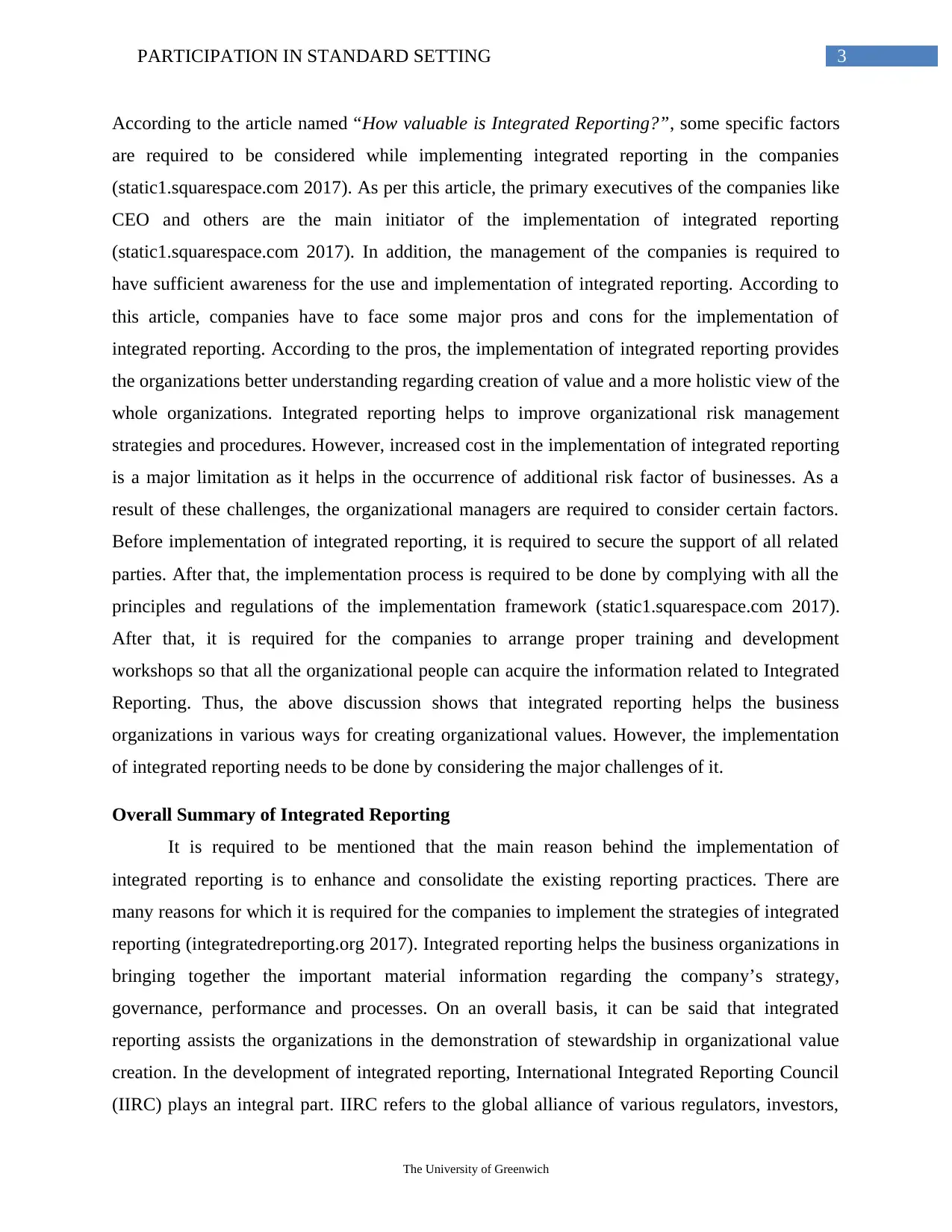
3PARTICIPATION IN STANDARD SETTING
According to the article named “How valuable is Integrated Reporting?”, some specific factors
are required to be considered while implementing integrated reporting in the companies
(static1.squarespace.com 2017). As per this article, the primary executives of the companies like
CEO and others are the main initiator of the implementation of integrated reporting
(static1.squarespace.com 2017). In addition, the management of the companies is required to
have sufficient awareness for the use and implementation of integrated reporting. According to
this article, companies have to face some major pros and cons for the implementation of
integrated reporting. According to the pros, the implementation of integrated reporting provides
the organizations better understanding regarding creation of value and a more holistic view of the
whole organizations. Integrated reporting helps to improve organizational risk management
strategies and procedures. However, increased cost in the implementation of integrated reporting
is a major limitation as it helps in the occurrence of additional risk factor of businesses. As a
result of these challenges, the organizational managers are required to consider certain factors.
Before implementation of integrated reporting, it is required to secure the support of all related
parties. After that, the implementation process is required to be done by complying with all the
principles and regulations of the implementation framework (static1.squarespace.com 2017).
After that, it is required for the companies to arrange proper training and development
workshops so that all the organizational people can acquire the information related to Integrated
Reporting. Thus, the above discussion shows that integrated reporting helps the business
organizations in various ways for creating organizational values. However, the implementation
of integrated reporting needs to be done by considering the major challenges of it.
Overall Summary of Integrated Reporting
It is required to be mentioned that the main reason behind the implementation of
integrated reporting is to enhance and consolidate the existing reporting practices. There are
many reasons for which it is required for the companies to implement the strategies of integrated
reporting (integratedreporting.org 2017). Integrated reporting helps the business organizations in
bringing together the important material information regarding the company’s strategy,
governance, performance and processes. On an overall basis, it can be said that integrated
reporting assists the organizations in the demonstration of stewardship in organizational value
creation. In the development of integrated reporting, International Integrated Reporting Council
(IIRC) plays an integral part. IIRC refers to the global alliance of various regulators, investors,
The University of Greenwich
According to the article named “How valuable is Integrated Reporting?”, some specific factors
are required to be considered while implementing integrated reporting in the companies
(static1.squarespace.com 2017). As per this article, the primary executives of the companies like
CEO and others are the main initiator of the implementation of integrated reporting
(static1.squarespace.com 2017). In addition, the management of the companies is required to
have sufficient awareness for the use and implementation of integrated reporting. According to
this article, companies have to face some major pros and cons for the implementation of
integrated reporting. According to the pros, the implementation of integrated reporting provides
the organizations better understanding regarding creation of value and a more holistic view of the
whole organizations. Integrated reporting helps to improve organizational risk management
strategies and procedures. However, increased cost in the implementation of integrated reporting
is a major limitation as it helps in the occurrence of additional risk factor of businesses. As a
result of these challenges, the organizational managers are required to consider certain factors.
Before implementation of integrated reporting, it is required to secure the support of all related
parties. After that, the implementation process is required to be done by complying with all the
principles and regulations of the implementation framework (static1.squarespace.com 2017).
After that, it is required for the companies to arrange proper training and development
workshops so that all the organizational people can acquire the information related to Integrated
Reporting. Thus, the above discussion shows that integrated reporting helps the business
organizations in various ways for creating organizational values. However, the implementation
of integrated reporting needs to be done by considering the major challenges of it.
Overall Summary of Integrated Reporting
It is required to be mentioned that the main reason behind the implementation of
integrated reporting is to enhance and consolidate the existing reporting practices. There are
many reasons for which it is required for the companies to implement the strategies of integrated
reporting (integratedreporting.org 2017). Integrated reporting helps the business organizations in
bringing together the important material information regarding the company’s strategy,
governance, performance and processes. On an overall basis, it can be said that integrated
reporting assists the organizations in the demonstration of stewardship in organizational value
creation. In the development of integrated reporting, International Integrated Reporting Council
(IIRC) plays an integral part. IIRC refers to the global alliance of various regulators, investors,
The University of Greenwich
Paraphrase This Document
Need a fresh take? Get an instant paraphrase of this document with our AI Paraphraser
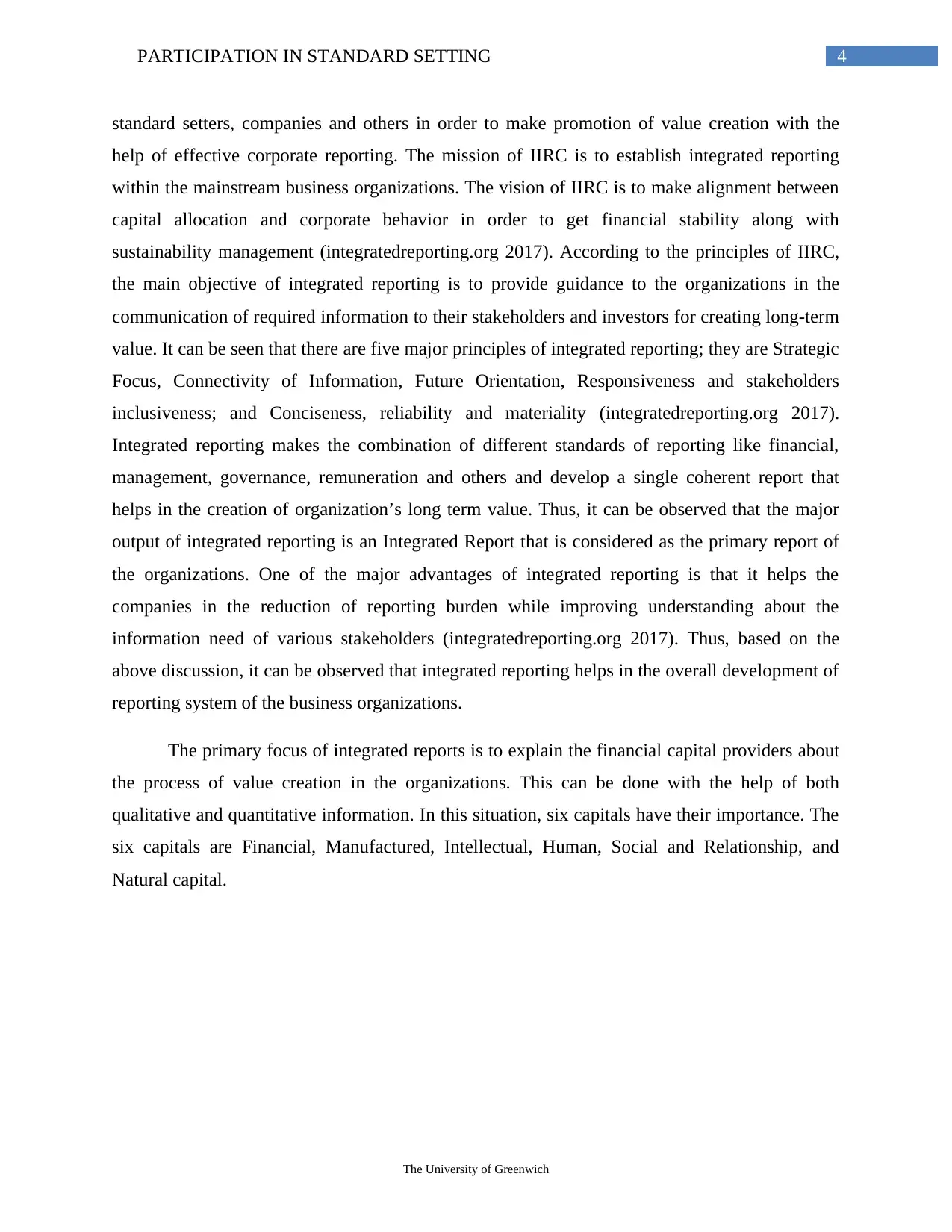
4PARTICIPATION IN STANDARD SETTING
standard setters, companies and others in order to make promotion of value creation with the
help of effective corporate reporting. The mission of IIRC is to establish integrated reporting
within the mainstream business organizations. The vision of IIRC is to make alignment between
capital allocation and corporate behavior in order to get financial stability along with
sustainability management (integratedreporting.org 2017). According to the principles of IIRC,
the main objective of integrated reporting is to provide guidance to the organizations in the
communication of required information to their stakeholders and investors for creating long-term
value. It can be seen that there are five major principles of integrated reporting; they are Strategic
Focus, Connectivity of Information, Future Orientation, Responsiveness and stakeholders
inclusiveness; and Conciseness, reliability and materiality (integratedreporting.org 2017).
Integrated reporting makes the combination of different standards of reporting like financial,
management, governance, remuneration and others and develop a single coherent report that
helps in the creation of organization’s long term value. Thus, it can be observed that the major
output of integrated reporting is an Integrated Report that is considered as the primary report of
the organizations. One of the major advantages of integrated reporting is that it helps the
companies in the reduction of reporting burden while improving understanding about the
information need of various stakeholders (integratedreporting.org 2017). Thus, based on the
above discussion, it can be observed that integrated reporting helps in the overall development of
reporting system of the business organizations.
The primary focus of integrated reports is to explain the financial capital providers about
the process of value creation in the organizations. This can be done with the help of both
qualitative and quantitative information. In this situation, six capitals have their importance. The
six capitals are Financial, Manufactured, Intellectual, Human, Social and Relationship, and
Natural capital.
The University of Greenwich
standard setters, companies and others in order to make promotion of value creation with the
help of effective corporate reporting. The mission of IIRC is to establish integrated reporting
within the mainstream business organizations. The vision of IIRC is to make alignment between
capital allocation and corporate behavior in order to get financial stability along with
sustainability management (integratedreporting.org 2017). According to the principles of IIRC,
the main objective of integrated reporting is to provide guidance to the organizations in the
communication of required information to their stakeholders and investors for creating long-term
value. It can be seen that there are five major principles of integrated reporting; they are Strategic
Focus, Connectivity of Information, Future Orientation, Responsiveness and stakeholders
inclusiveness; and Conciseness, reliability and materiality (integratedreporting.org 2017).
Integrated reporting makes the combination of different standards of reporting like financial,
management, governance, remuneration and others and develop a single coherent report that
helps in the creation of organization’s long term value. Thus, it can be observed that the major
output of integrated reporting is an Integrated Report that is considered as the primary report of
the organizations. One of the major advantages of integrated reporting is that it helps the
companies in the reduction of reporting burden while improving understanding about the
information need of various stakeholders (integratedreporting.org 2017). Thus, based on the
above discussion, it can be observed that integrated reporting helps in the overall development of
reporting system of the business organizations.
The primary focus of integrated reports is to explain the financial capital providers about
the process of value creation in the organizations. This can be done with the help of both
qualitative and quantitative information. In this situation, six capitals have their importance. The
six capitals are Financial, Manufactured, Intellectual, Human, Social and Relationship, and
Natural capital.
The University of Greenwich
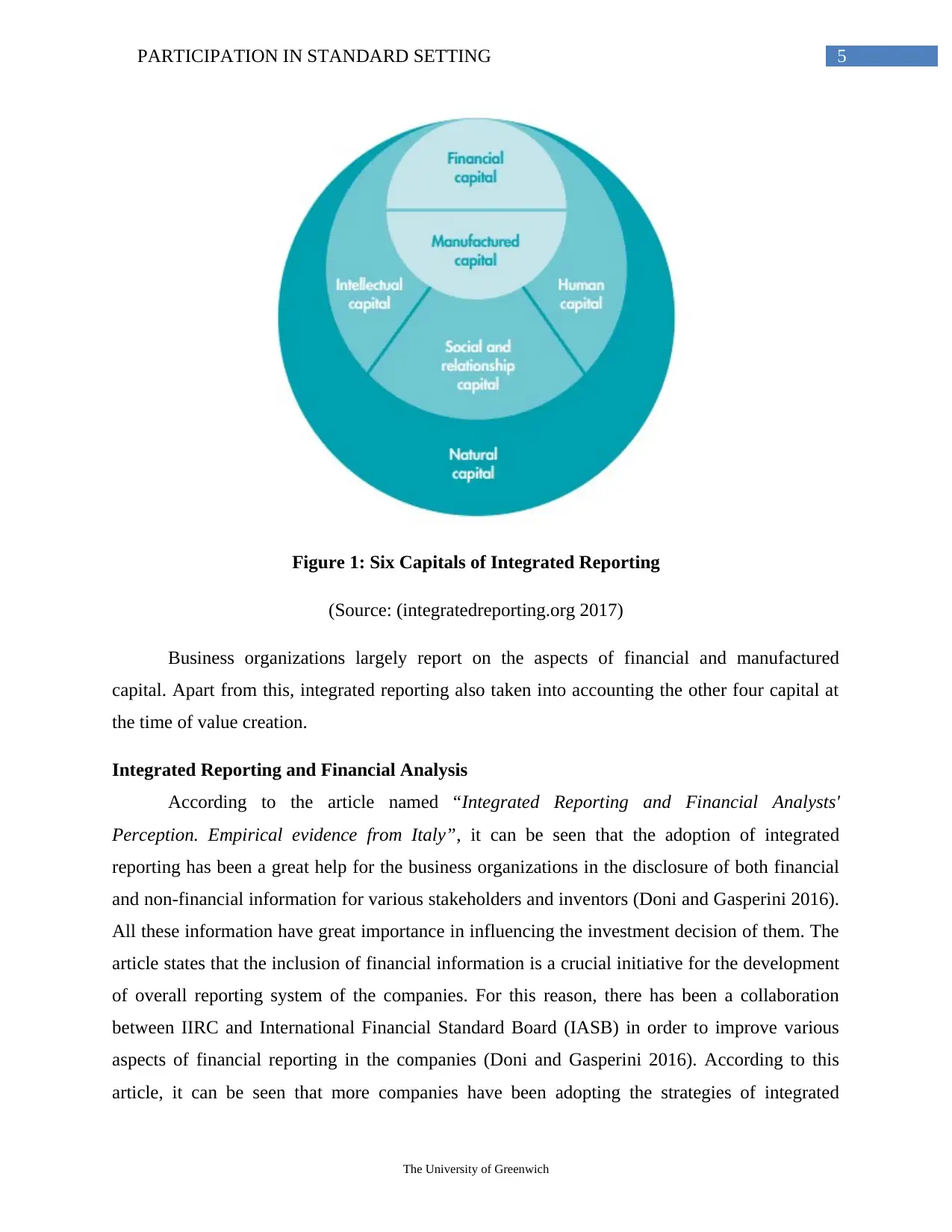
5PARTICIPATION IN STANDARD SETTING
Figure 1: Six Capitals of Integrated Reporting
(Source: (integratedreporting.org 2017)
Business organizations largely report on the aspects of financial and manufactured
capital. Apart from this, integrated reporting also taken into accounting the other four capital at
the time of value creation.
Integrated Reporting and Financial Analysis
According to the article named “Integrated Reporting and Financial Analysts'
Perception. Empirical evidence from Italy”, it can be seen that the adoption of integrated
reporting has been a great help for the business organizations in the disclosure of both financial
and non-financial information for various stakeholders and inventors (Doni and Gasperini 2016).
All these information have great importance in influencing the investment decision of them. The
article states that the inclusion of financial information is a crucial initiative for the development
of overall reporting system of the companies. For this reason, there has been a collaboration
between IIRC and International Financial Standard Board (IASB) in order to improve various
aspects of financial reporting in the companies (Doni and Gasperini 2016). According to this
article, it can be seen that more companies have been adopting the strategies of integrated
The University of Greenwich
Figure 1: Six Capitals of Integrated Reporting
(Source: (integratedreporting.org 2017)
Business organizations largely report on the aspects of financial and manufactured
capital. Apart from this, integrated reporting also taken into accounting the other four capital at
the time of value creation.
Integrated Reporting and Financial Analysis
According to the article named “Integrated Reporting and Financial Analysts'
Perception. Empirical evidence from Italy”, it can be seen that the adoption of integrated
reporting has been a great help for the business organizations in the disclosure of both financial
and non-financial information for various stakeholders and inventors (Doni and Gasperini 2016).
All these information have great importance in influencing the investment decision of them. The
article states that the inclusion of financial information is a crucial initiative for the development
of overall reporting system of the companies. For this reason, there has been a collaboration
between IIRC and International Financial Standard Board (IASB) in order to improve various
aspects of financial reporting in the companies (Doni and Gasperini 2016). According to this
article, it can be seen that more companies have been adopting the strategies of integrated
The University of Greenwich
⊘ This is a preview!⊘
Do you want full access?
Subscribe today to unlock all pages.

Trusted by 1+ million students worldwide
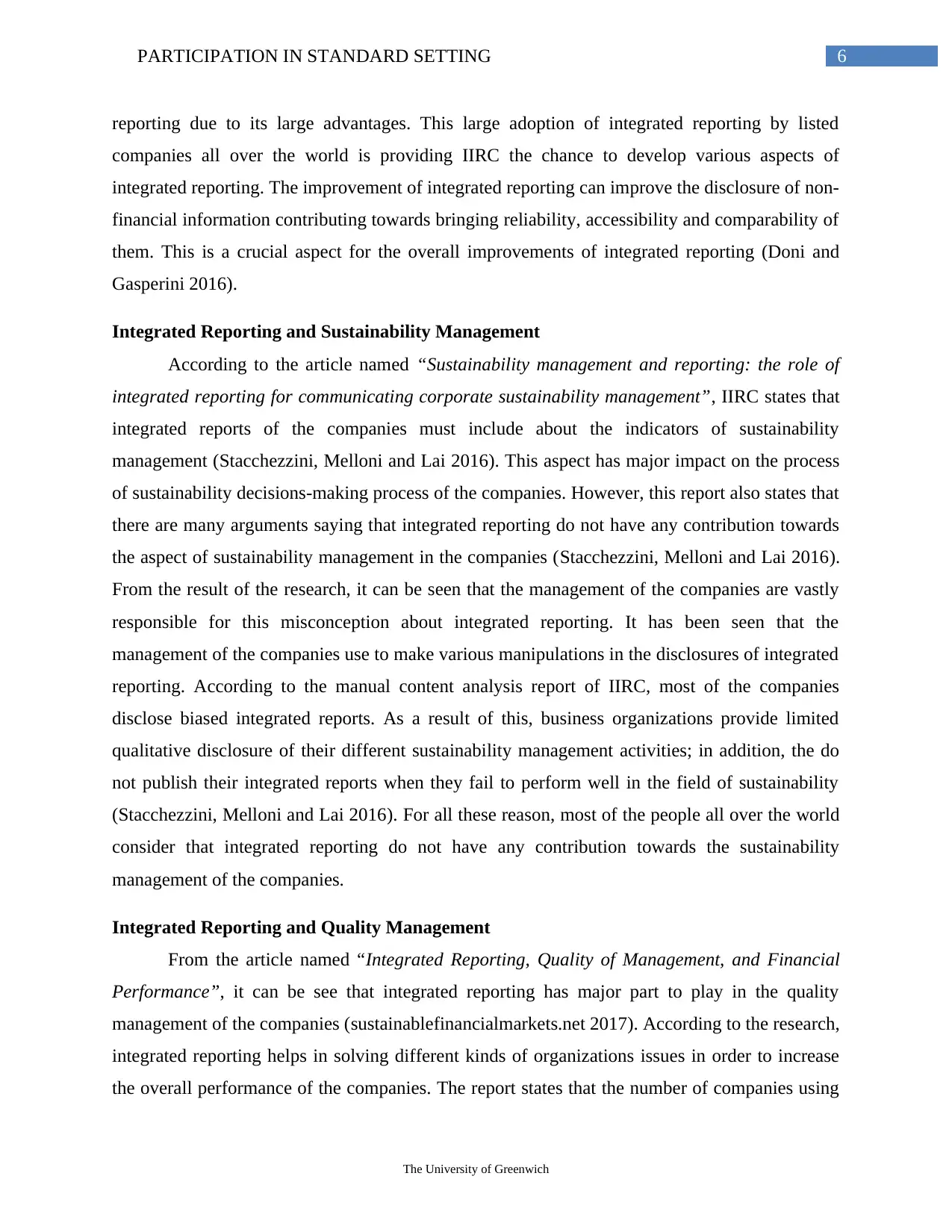
6PARTICIPATION IN STANDARD SETTING
reporting due to its large advantages. This large adoption of integrated reporting by listed
companies all over the world is providing IIRC the chance to develop various aspects of
integrated reporting. The improvement of integrated reporting can improve the disclosure of non-
financial information contributing towards bringing reliability, accessibility and comparability of
them. This is a crucial aspect for the overall improvements of integrated reporting (Doni and
Gasperini 2016).
Integrated Reporting and Sustainability Management
According to the article named “Sustainability management and reporting: the role of
integrated reporting for communicating corporate sustainability management”, IIRC states that
integrated reports of the companies must include about the indicators of sustainability
management (Stacchezzini, Melloni and Lai 2016). This aspect has major impact on the process
of sustainability decisions-making process of the companies. However, this report also states that
there are many arguments saying that integrated reporting do not have any contribution towards
the aspect of sustainability management in the companies (Stacchezzini, Melloni and Lai 2016).
From the result of the research, it can be seen that the management of the companies are vastly
responsible for this misconception about integrated reporting. It has been seen that the
management of the companies use to make various manipulations in the disclosures of integrated
reporting. According to the manual content analysis report of IIRC, most of the companies
disclose biased integrated reports. As a result of this, business organizations provide limited
qualitative disclosure of their different sustainability management activities; in addition, the do
not publish their integrated reports when they fail to perform well in the field of sustainability
(Stacchezzini, Melloni and Lai 2016). For all these reason, most of the people all over the world
consider that integrated reporting do not have any contribution towards the sustainability
management of the companies.
Integrated Reporting and Quality Management
From the article named “Integrated Reporting, Quality of Management, and Financial
Performance”, it can be see that integrated reporting has major part to play in the quality
management of the companies (sustainablefinancialmarkets.net 2017). According to the research,
integrated reporting helps in solving different kinds of organizations issues in order to increase
the overall performance of the companies. The report states that the number of companies using
The University of Greenwich
reporting due to its large advantages. This large adoption of integrated reporting by listed
companies all over the world is providing IIRC the chance to develop various aspects of
integrated reporting. The improvement of integrated reporting can improve the disclosure of non-
financial information contributing towards bringing reliability, accessibility and comparability of
them. This is a crucial aspect for the overall improvements of integrated reporting (Doni and
Gasperini 2016).
Integrated Reporting and Sustainability Management
According to the article named “Sustainability management and reporting: the role of
integrated reporting for communicating corporate sustainability management”, IIRC states that
integrated reports of the companies must include about the indicators of sustainability
management (Stacchezzini, Melloni and Lai 2016). This aspect has major impact on the process
of sustainability decisions-making process of the companies. However, this report also states that
there are many arguments saying that integrated reporting do not have any contribution towards
the aspect of sustainability management in the companies (Stacchezzini, Melloni and Lai 2016).
From the result of the research, it can be seen that the management of the companies are vastly
responsible for this misconception about integrated reporting. It has been seen that the
management of the companies use to make various manipulations in the disclosures of integrated
reporting. According to the manual content analysis report of IIRC, most of the companies
disclose biased integrated reports. As a result of this, business organizations provide limited
qualitative disclosure of their different sustainability management activities; in addition, the do
not publish their integrated reports when they fail to perform well in the field of sustainability
(Stacchezzini, Melloni and Lai 2016). For all these reason, most of the people all over the world
consider that integrated reporting do not have any contribution towards the sustainability
management of the companies.
Integrated Reporting and Quality Management
From the article named “Integrated Reporting, Quality of Management, and Financial
Performance”, it can be see that integrated reporting has major part to play in the quality
management of the companies (sustainablefinancialmarkets.net 2017). According to the research,
integrated reporting helps in solving different kinds of organizations issues in order to increase
the overall performance of the companies. The report states that the number of companies using
The University of Greenwich
Paraphrase This Document
Need a fresh take? Get an instant paraphrase of this document with our AI Paraphraser
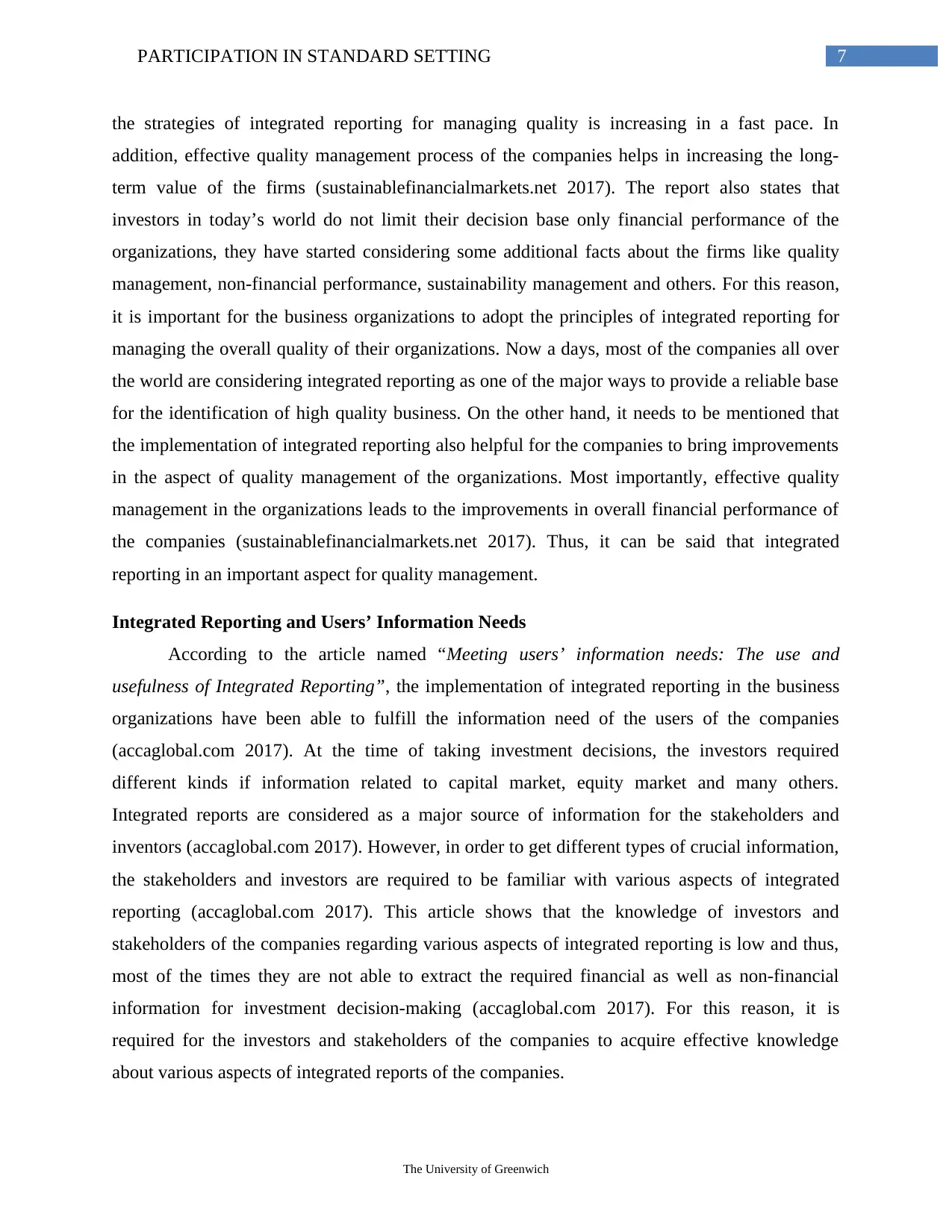
7PARTICIPATION IN STANDARD SETTING
the strategies of integrated reporting for managing quality is increasing in a fast pace. In
addition, effective quality management process of the companies helps in increasing the long-
term value of the firms (sustainablefinancialmarkets.net 2017). The report also states that
investors in today’s world do not limit their decision base only financial performance of the
organizations, they have started considering some additional facts about the firms like quality
management, non-financial performance, sustainability management and others. For this reason,
it is important for the business organizations to adopt the principles of integrated reporting for
managing the overall quality of their organizations. Now a days, most of the companies all over
the world are considering integrated reporting as one of the major ways to provide a reliable base
for the identification of high quality business. On the other hand, it needs to be mentioned that
the implementation of integrated reporting also helpful for the companies to bring improvements
in the aspect of quality management of the organizations. Most importantly, effective quality
management in the organizations leads to the improvements in overall financial performance of
the companies (sustainablefinancialmarkets.net 2017). Thus, it can be said that integrated
reporting in an important aspect for quality management.
Integrated Reporting and Users’ Information Needs
According to the article named “Meeting users’ information needs: The use and
usefulness of Integrated Reporting”, the implementation of integrated reporting in the business
organizations have been able to fulfill the information need of the users of the companies
(accaglobal.com 2017). At the time of taking investment decisions, the investors required
different kinds if information related to capital market, equity market and many others.
Integrated reports are considered as a major source of information for the stakeholders and
inventors (accaglobal.com 2017). However, in order to get different types of crucial information,
the stakeholders and investors are required to be familiar with various aspects of integrated
reporting (accaglobal.com 2017). This article shows that the knowledge of investors and
stakeholders of the companies regarding various aspects of integrated reporting is low and thus,
most of the times they are not able to extract the required financial as well as non-financial
information for investment decision-making (accaglobal.com 2017). For this reason, it is
required for the investors and stakeholders of the companies to acquire effective knowledge
about various aspects of integrated reports of the companies.
The University of Greenwich
the strategies of integrated reporting for managing quality is increasing in a fast pace. In
addition, effective quality management process of the companies helps in increasing the long-
term value of the firms (sustainablefinancialmarkets.net 2017). The report also states that
investors in today’s world do not limit their decision base only financial performance of the
organizations, they have started considering some additional facts about the firms like quality
management, non-financial performance, sustainability management and others. For this reason,
it is important for the business organizations to adopt the principles of integrated reporting for
managing the overall quality of their organizations. Now a days, most of the companies all over
the world are considering integrated reporting as one of the major ways to provide a reliable base
for the identification of high quality business. On the other hand, it needs to be mentioned that
the implementation of integrated reporting also helpful for the companies to bring improvements
in the aspect of quality management of the organizations. Most importantly, effective quality
management in the organizations leads to the improvements in overall financial performance of
the companies (sustainablefinancialmarkets.net 2017). Thus, it can be said that integrated
reporting in an important aspect for quality management.
Integrated Reporting and Users’ Information Needs
According to the article named “Meeting users’ information needs: The use and
usefulness of Integrated Reporting”, the implementation of integrated reporting in the business
organizations have been able to fulfill the information need of the users of the companies
(accaglobal.com 2017). At the time of taking investment decisions, the investors required
different kinds if information related to capital market, equity market and many others.
Integrated reports are considered as a major source of information for the stakeholders and
inventors (accaglobal.com 2017). However, in order to get different types of crucial information,
the stakeholders and investors are required to be familiar with various aspects of integrated
reporting (accaglobal.com 2017). This article shows that the knowledge of investors and
stakeholders of the companies regarding various aspects of integrated reporting is low and thus,
most of the times they are not able to extract the required financial as well as non-financial
information for investment decision-making (accaglobal.com 2017). For this reason, it is
required for the investors and stakeholders of the companies to acquire effective knowledge
about various aspects of integrated reports of the companies.
The University of Greenwich
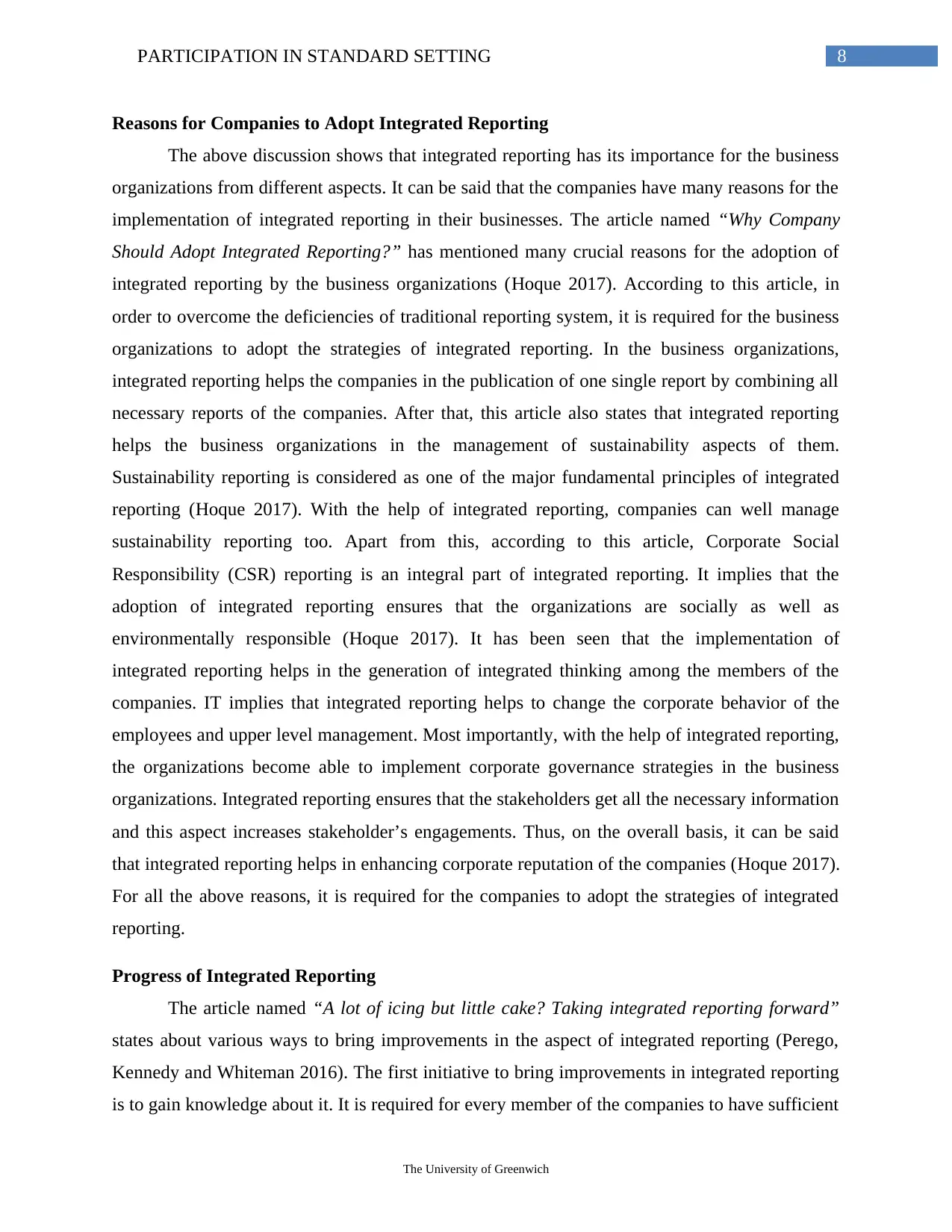
8PARTICIPATION IN STANDARD SETTING
Reasons for Companies to Adopt Integrated Reporting
The above discussion shows that integrated reporting has its importance for the business
organizations from different aspects. It can be said that the companies have many reasons for the
implementation of integrated reporting in their businesses. The article named “Why Company
Should Adopt Integrated Reporting?” has mentioned many crucial reasons for the adoption of
integrated reporting by the business organizations (Hoque 2017). According to this article, in
order to overcome the deficiencies of traditional reporting system, it is required for the business
organizations to adopt the strategies of integrated reporting. In the business organizations,
integrated reporting helps the companies in the publication of one single report by combining all
necessary reports of the companies. After that, this article also states that integrated reporting
helps the business organizations in the management of sustainability aspects of them.
Sustainability reporting is considered as one of the major fundamental principles of integrated
reporting (Hoque 2017). With the help of integrated reporting, companies can well manage
sustainability reporting too. Apart from this, according to this article, Corporate Social
Responsibility (CSR) reporting is an integral part of integrated reporting. It implies that the
adoption of integrated reporting ensures that the organizations are socially as well as
environmentally responsible (Hoque 2017). It has been seen that the implementation of
integrated reporting helps in the generation of integrated thinking among the members of the
companies. IT implies that integrated reporting helps to change the corporate behavior of the
employees and upper level management. Most importantly, with the help of integrated reporting,
the organizations become able to implement corporate governance strategies in the business
organizations. Integrated reporting ensures that the stakeholders get all the necessary information
and this aspect increases stakeholder’s engagements. Thus, on the overall basis, it can be said
that integrated reporting helps in enhancing corporate reputation of the companies (Hoque 2017).
For all the above reasons, it is required for the companies to adopt the strategies of integrated
reporting.
Progress of Integrated Reporting
The article named “A lot of icing but little cake? Taking integrated reporting forward”
states about various ways to bring improvements in the aspect of integrated reporting (Perego,
Kennedy and Whiteman 2016). The first initiative to bring improvements in integrated reporting
is to gain knowledge about it. It is required for every member of the companies to have sufficient
The University of Greenwich
Reasons for Companies to Adopt Integrated Reporting
The above discussion shows that integrated reporting has its importance for the business
organizations from different aspects. It can be said that the companies have many reasons for the
implementation of integrated reporting in their businesses. The article named “Why Company
Should Adopt Integrated Reporting?” has mentioned many crucial reasons for the adoption of
integrated reporting by the business organizations (Hoque 2017). According to this article, in
order to overcome the deficiencies of traditional reporting system, it is required for the business
organizations to adopt the strategies of integrated reporting. In the business organizations,
integrated reporting helps the companies in the publication of one single report by combining all
necessary reports of the companies. After that, this article also states that integrated reporting
helps the business organizations in the management of sustainability aspects of them.
Sustainability reporting is considered as one of the major fundamental principles of integrated
reporting (Hoque 2017). With the help of integrated reporting, companies can well manage
sustainability reporting too. Apart from this, according to this article, Corporate Social
Responsibility (CSR) reporting is an integral part of integrated reporting. It implies that the
adoption of integrated reporting ensures that the organizations are socially as well as
environmentally responsible (Hoque 2017). It has been seen that the implementation of
integrated reporting helps in the generation of integrated thinking among the members of the
companies. IT implies that integrated reporting helps to change the corporate behavior of the
employees and upper level management. Most importantly, with the help of integrated reporting,
the organizations become able to implement corporate governance strategies in the business
organizations. Integrated reporting ensures that the stakeholders get all the necessary information
and this aspect increases stakeholder’s engagements. Thus, on the overall basis, it can be said
that integrated reporting helps in enhancing corporate reputation of the companies (Hoque 2017).
For all the above reasons, it is required for the companies to adopt the strategies of integrated
reporting.
Progress of Integrated Reporting
The article named “A lot of icing but little cake? Taking integrated reporting forward”
states about various ways to bring improvements in the aspect of integrated reporting (Perego,
Kennedy and Whiteman 2016). The first initiative to bring improvements in integrated reporting
is to gain knowledge about it. It is required for every member of the companies to have sufficient
The University of Greenwich
⊘ This is a preview!⊘
Do you want full access?
Subscribe today to unlock all pages.

Trusted by 1+ million students worldwide
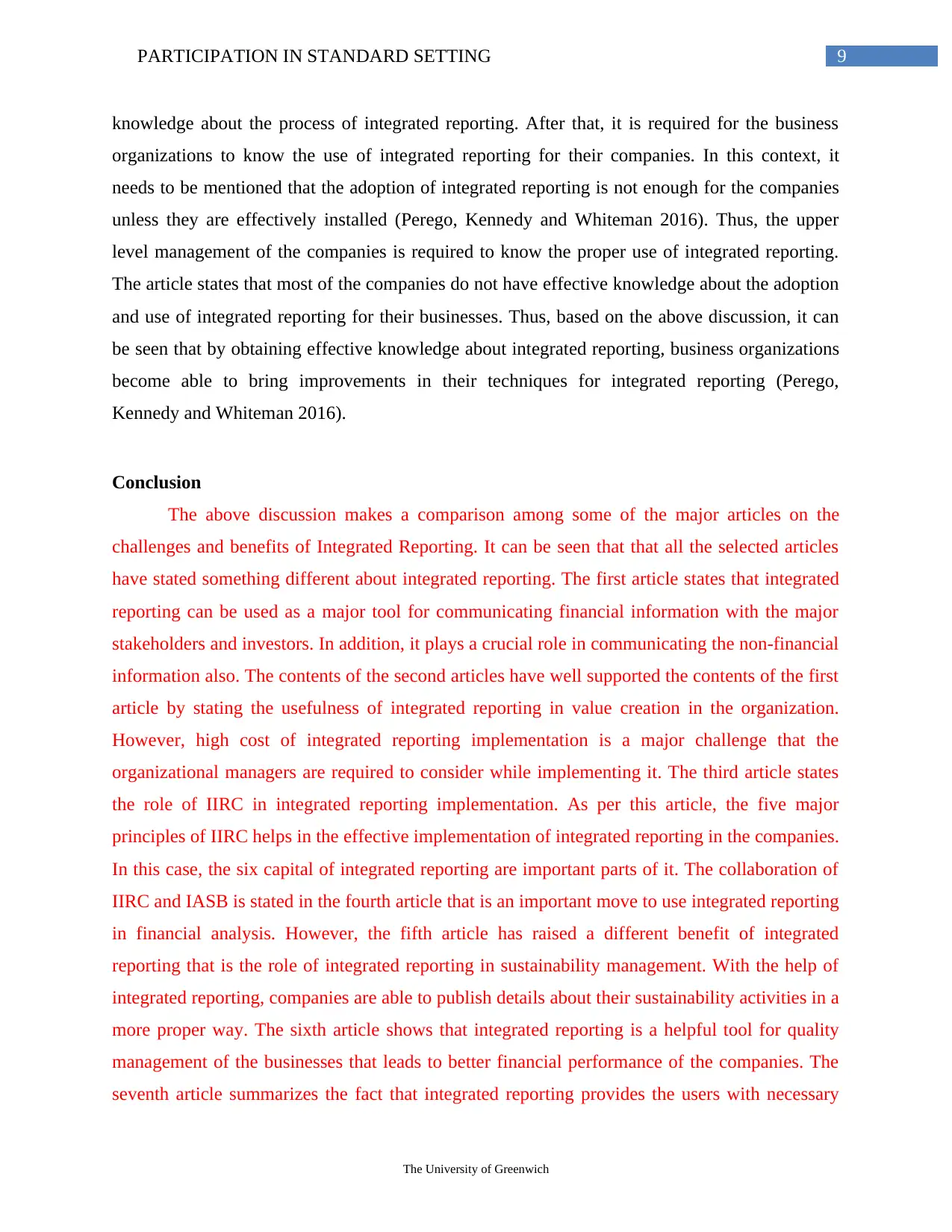
9PARTICIPATION IN STANDARD SETTING
knowledge about the process of integrated reporting. After that, it is required for the business
organizations to know the use of integrated reporting for their companies. In this context, it
needs to be mentioned that the adoption of integrated reporting is not enough for the companies
unless they are effectively installed (Perego, Kennedy and Whiteman 2016). Thus, the upper
level management of the companies is required to know the proper use of integrated reporting.
The article states that most of the companies do not have effective knowledge about the adoption
and use of integrated reporting for their businesses. Thus, based on the above discussion, it can
be seen that by obtaining effective knowledge about integrated reporting, business organizations
become able to bring improvements in their techniques for integrated reporting (Perego,
Kennedy and Whiteman 2016).
Conclusion
The above discussion makes a comparison among some of the major articles on the
challenges and benefits of Integrated Reporting. It can be seen that that all the selected articles
have stated something different about integrated reporting. The first article states that integrated
reporting can be used as a major tool for communicating financial information with the major
stakeholders and investors. In addition, it plays a crucial role in communicating the non-financial
information also. The contents of the second articles have well supported the contents of the first
article by stating the usefulness of integrated reporting in value creation in the organization.
However, high cost of integrated reporting implementation is a major challenge that the
organizational managers are required to consider while implementing it. The third article states
the role of IIRC in integrated reporting implementation. As per this article, the five major
principles of IIRC helps in the effective implementation of integrated reporting in the companies.
In this case, the six capital of integrated reporting are important parts of it. The collaboration of
IIRC and IASB is stated in the fourth article that is an important move to use integrated reporting
in financial analysis. However, the fifth article has raised a different benefit of integrated
reporting that is the role of integrated reporting in sustainability management. With the help of
integrated reporting, companies are able to publish details about their sustainability activities in a
more proper way. The sixth article shows that integrated reporting is a helpful tool for quality
management of the businesses that leads to better financial performance of the companies. The
seventh article summarizes the fact that integrated reporting provides the users with necessary
The University of Greenwich
knowledge about the process of integrated reporting. After that, it is required for the business
organizations to know the use of integrated reporting for their companies. In this context, it
needs to be mentioned that the adoption of integrated reporting is not enough for the companies
unless they are effectively installed (Perego, Kennedy and Whiteman 2016). Thus, the upper
level management of the companies is required to know the proper use of integrated reporting.
The article states that most of the companies do not have effective knowledge about the adoption
and use of integrated reporting for their businesses. Thus, based on the above discussion, it can
be seen that by obtaining effective knowledge about integrated reporting, business organizations
become able to bring improvements in their techniques for integrated reporting (Perego,
Kennedy and Whiteman 2016).
Conclusion
The above discussion makes a comparison among some of the major articles on the
challenges and benefits of Integrated Reporting. It can be seen that that all the selected articles
have stated something different about integrated reporting. The first article states that integrated
reporting can be used as a major tool for communicating financial information with the major
stakeholders and investors. In addition, it plays a crucial role in communicating the non-financial
information also. The contents of the second articles have well supported the contents of the first
article by stating the usefulness of integrated reporting in value creation in the organization.
However, high cost of integrated reporting implementation is a major challenge that the
organizational managers are required to consider while implementing it. The third article states
the role of IIRC in integrated reporting implementation. As per this article, the five major
principles of IIRC helps in the effective implementation of integrated reporting in the companies.
In this case, the six capital of integrated reporting are important parts of it. The collaboration of
IIRC and IASB is stated in the fourth article that is an important move to use integrated reporting
in financial analysis. However, the fifth article has raised a different benefit of integrated
reporting that is the role of integrated reporting in sustainability management. With the help of
integrated reporting, companies are able to publish details about their sustainability activities in a
more proper way. The sixth article shows that integrated reporting is a helpful tool for quality
management of the businesses that leads to better financial performance of the companies. The
seventh article summarizes the fact that integrated reporting provides the users with necessary
The University of Greenwich
Paraphrase This Document
Need a fresh take? Get an instant paraphrase of this document with our AI Paraphraser
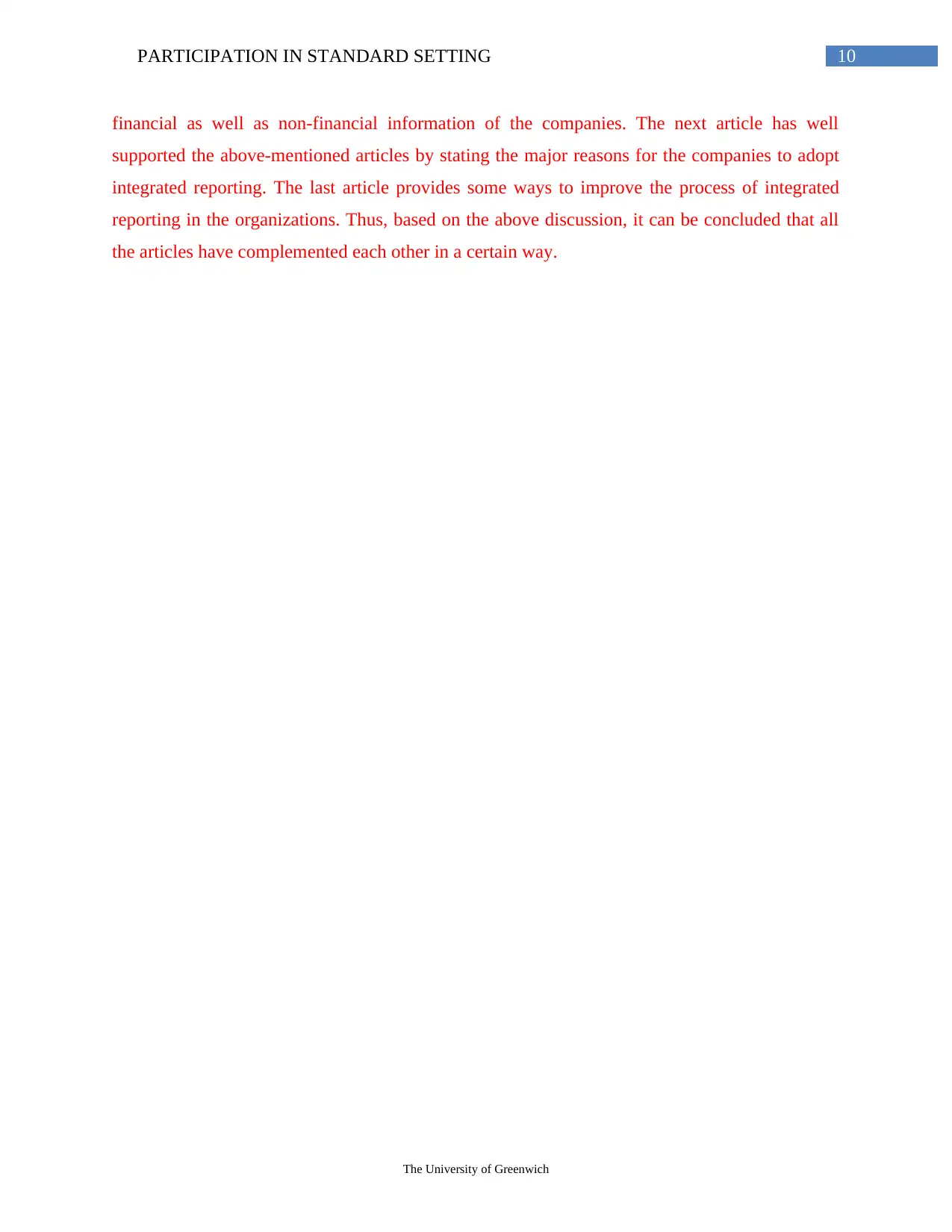
10PARTICIPATION IN STANDARD SETTING
financial as well as non-financial information of the companies. The next article has well
supported the above-mentioned articles by stating the major reasons for the companies to adopt
integrated reporting. The last article provides some ways to improve the process of integrated
reporting in the organizations. Thus, based on the above discussion, it can be concluded that all
the articles have complemented each other in a certain way.
The University of Greenwich
financial as well as non-financial information of the companies. The next article has well
supported the above-mentioned articles by stating the major reasons for the companies to adopt
integrated reporting. The last article provides some ways to improve the process of integrated
reporting in the organizations. Thus, based on the above discussion, it can be concluded that all
the articles have complemented each other in a certain way.
The University of Greenwich
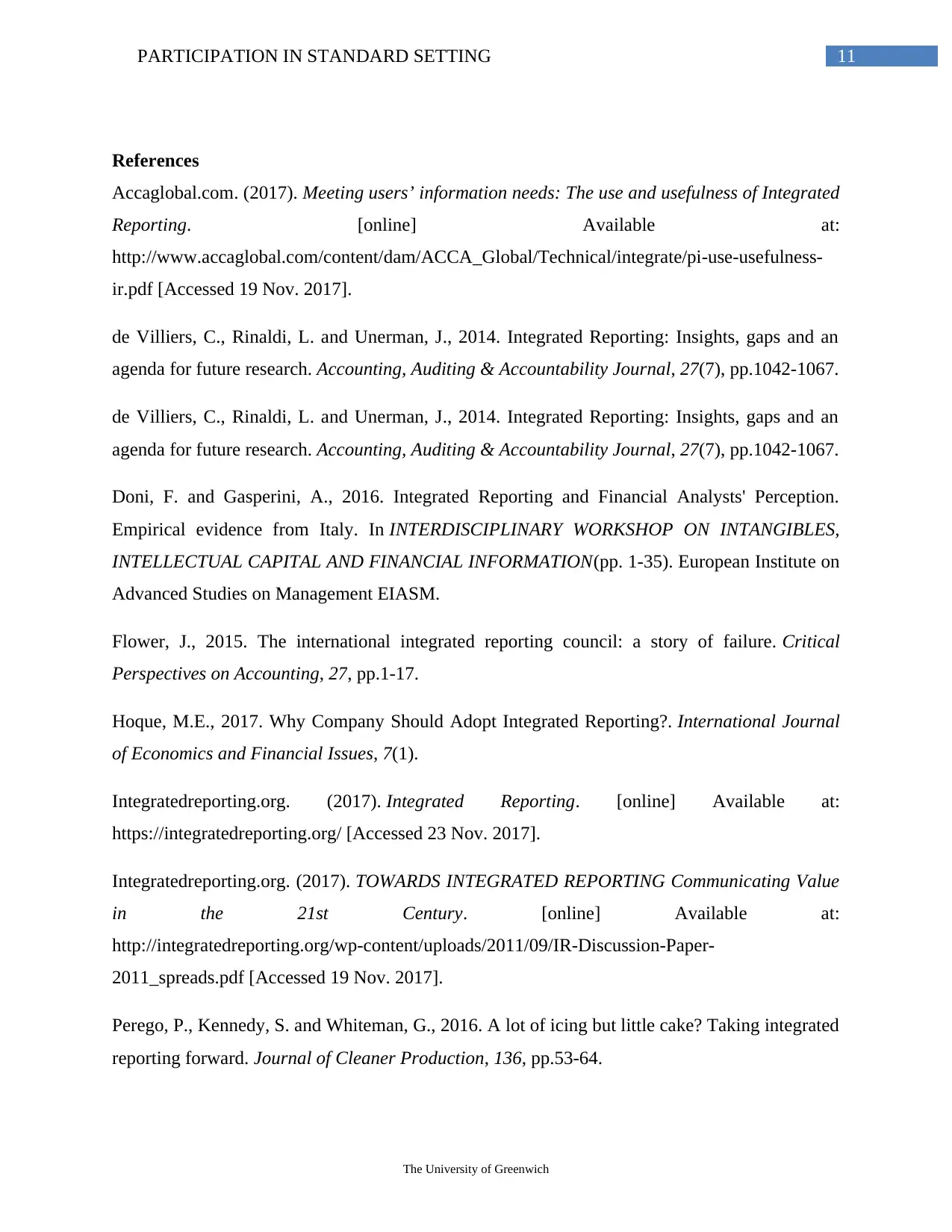
11PARTICIPATION IN STANDARD SETTING
References
Accaglobal.com. (2017). Meeting users’ information needs: The use and usefulness of Integrated
Reporting. [online] Available at:
http://www.accaglobal.com/content/dam/ACCA_Global/Technical/integrate/pi-use-usefulness-
ir.pdf [Accessed 19 Nov. 2017].
de Villiers, C., Rinaldi, L. and Unerman, J., 2014. Integrated Reporting: Insights, gaps and an
agenda for future research. Accounting, Auditing & Accountability Journal, 27(7), pp.1042-1067.
de Villiers, C., Rinaldi, L. and Unerman, J., 2014. Integrated Reporting: Insights, gaps and an
agenda for future research. Accounting, Auditing & Accountability Journal, 27(7), pp.1042-1067.
Doni, F. and Gasperini, A., 2016. Integrated Reporting and Financial Analysts' Perception.
Empirical evidence from Italy. In INTERDISCIPLINARY WORKSHOP ON INTANGIBLES,
INTELLECTUAL CAPITAL AND FINANCIAL INFORMATION(pp. 1-35). European Institute on
Advanced Studies on Management EIASM.
Flower, J., 2015. The international integrated reporting council: a story of failure. Critical
Perspectives on Accounting, 27, pp.1-17.
Hoque, M.E., 2017. Why Company Should Adopt Integrated Reporting?. International Journal
of Economics and Financial Issues, 7(1).
Integratedreporting.org. (2017). Integrated Reporting. [online] Available at:
https://integratedreporting.org/ [Accessed 23 Nov. 2017].
Integratedreporting.org. (2017). TOWARDS INTEGRATED REPORTING Communicating Value
in the 21st Century. [online] Available at:
http://integratedreporting.org/wp-content/uploads/2011/09/IR-Discussion-Paper-
2011_spreads.pdf [Accessed 19 Nov. 2017].
Perego, P., Kennedy, S. and Whiteman, G., 2016. A lot of icing but little cake? Taking integrated
reporting forward. Journal of Cleaner Production, 136, pp.53-64.
The University of Greenwich
References
Accaglobal.com. (2017). Meeting users’ information needs: The use and usefulness of Integrated
Reporting. [online] Available at:
http://www.accaglobal.com/content/dam/ACCA_Global/Technical/integrate/pi-use-usefulness-
ir.pdf [Accessed 19 Nov. 2017].
de Villiers, C., Rinaldi, L. and Unerman, J., 2014. Integrated Reporting: Insights, gaps and an
agenda for future research. Accounting, Auditing & Accountability Journal, 27(7), pp.1042-1067.
de Villiers, C., Rinaldi, L. and Unerman, J., 2014. Integrated Reporting: Insights, gaps and an
agenda for future research. Accounting, Auditing & Accountability Journal, 27(7), pp.1042-1067.
Doni, F. and Gasperini, A., 2016. Integrated Reporting and Financial Analysts' Perception.
Empirical evidence from Italy. In INTERDISCIPLINARY WORKSHOP ON INTANGIBLES,
INTELLECTUAL CAPITAL AND FINANCIAL INFORMATION(pp. 1-35). European Institute on
Advanced Studies on Management EIASM.
Flower, J., 2015. The international integrated reporting council: a story of failure. Critical
Perspectives on Accounting, 27, pp.1-17.
Hoque, M.E., 2017. Why Company Should Adopt Integrated Reporting?. International Journal
of Economics and Financial Issues, 7(1).
Integratedreporting.org. (2017). Integrated Reporting. [online] Available at:
https://integratedreporting.org/ [Accessed 23 Nov. 2017].
Integratedreporting.org. (2017). TOWARDS INTEGRATED REPORTING Communicating Value
in the 21st Century. [online] Available at:
http://integratedreporting.org/wp-content/uploads/2011/09/IR-Discussion-Paper-
2011_spreads.pdf [Accessed 19 Nov. 2017].
Perego, P., Kennedy, S. and Whiteman, G., 2016. A lot of icing but little cake? Taking integrated
reporting forward. Journal of Cleaner Production, 136, pp.53-64.
The University of Greenwich
⊘ This is a preview!⊘
Do you want full access?
Subscribe today to unlock all pages.

Trusted by 1+ million students worldwide
1 out of 13
Related Documents
Your All-in-One AI-Powered Toolkit for Academic Success.
+13062052269
info@desklib.com
Available 24*7 on WhatsApp / Email
![[object Object]](/_next/static/media/star-bottom.7253800d.svg)
Unlock your academic potential
Copyright © 2020–2026 A2Z Services. All Rights Reserved. Developed and managed by ZUCOL.





